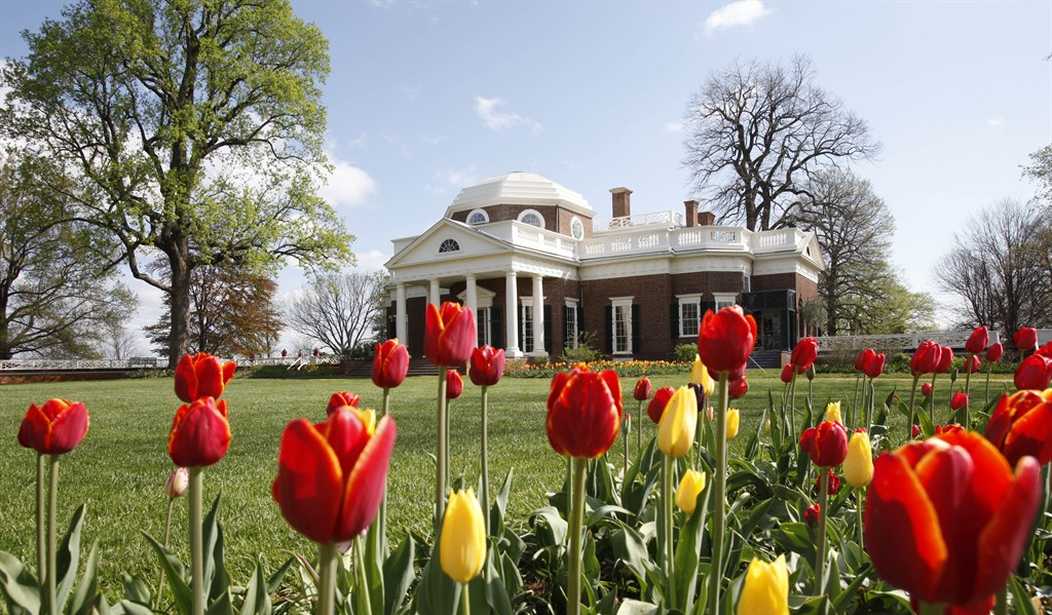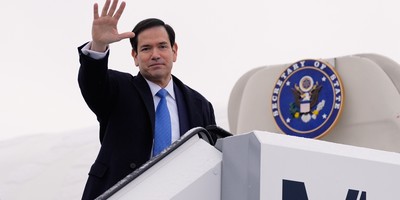We patriots love to quote the Founding Fathers, especially when they support our theses. And Jefferson remains at the top of the heap. But there are three beliefs or practices often attributed to Jefferson that are either myths or cherry-picked partial views.
The first myth is that Jefferson was for big government. Nothing could be further from the truth.
Though Jefferson expanded U.S. territory through enactments such as the 1803 Louisiana Purchase, he knew that when it comes to expanding government, "the natural progress of things is for liberty to yield, and government to gain ground."
The Miller Center at our third president's own University of Virginia put it well: "In Thomas Jefferson's mind, the first order of business for him as President was the establishment of a 'wise and frugal Government, which shall restrain men from injuring one another' but which would otherwise leave them alone to regulate their own affairs. He wanted a government that would respect the authority of individual states, operate with a smaller bureaucracy, and cut its debts."
Jefferson was actually for smaller government, less debt and low taxes. About eight years after his two terms as president, Jefferson wrote: "We must make our election between economy and liberty, or profusion and servitude. If we run into such debts as that we must be taxed in our meat and in our drink, in our necessaries and our comforts, in our labors and our amusements, for our callings and our creeds, as the people of England are, our people, like them, must come to labor sixteen hours in the twenty-four, give the earnings of fifteen of these to the government for their debts and daily expenses, and the sixteenth being insufficient to afford us bread, we must live, as they now do, on oatmeal and potatoes, have no time to think, no means of calling the mismanagers to account, but be glad to obtain subsistence by hiring ourselves to rivet their chains on the necks of our fellow-sufferers."
Recommended
The second myth about Jefferson is that he was always an isolationist or noninterventionist, that he believed the U.S. should avoid alliances with other nations so as not to draw the U.S. into wars not related to direct territorial self-defense.
True, President Jefferson is often noted as extending George Washington's ideas of commercial-only relations with other countries. For example, in his March 4, 1801, inaugural address, he said, "Peace, commerce and honest friendship with all nations, entangling alliances with none."
But a brief view of virtually any country's history, including America's, and Jeffersonian actions in government easily demonstrates that commercial-only relations more often than not morph into "entangling alliances."
Case in point: France. Our founders were largely noninterventionists, at least in desire and theory. But when push came to shove, for example, our founders signed the Treaty of Alliance with France on Feb. 6, 1778, creating a military alliance between the U.S. and France against Great Britain. The U.S. also signed the Treaty of Amity and Commerce with France on Feb. 6, 1778, endorsing trade and commerce between the countries. In May 1778, Richard Henry Lee informed Jefferson that all three treaties with France were signed.
And if one thinks those treaties were signed only to secure freedom and stability in the Revolutionary era, consider that they weren't annulled by Congress until 1798. If 20 years doesn't qualify as an "entangled alliance," then what does?
Jefferson's own enablement of an entangled alliance with France seems to be further supported by the fact that he was one of America's greatest Francophiles and lived some of the best years of his life in Paris -- from August 1784 to September 1789 -- bringing back dozens of crates from the European culture to his own Monticello estate.
Let's also not forget that on another battlefront, Jefferson confessed to Congress in 1801 that he was "unauthorized by the Constitution, without the sanction of Congress, to go beyond the line of defense" when he ordered a small fleet of warships to the Mediterranean to ward off attacks by the Barbary States. Marines and warships were deployed to the region, which eventually led to the surrender of Tripoli in 1805. Nevertheless, it would take another decade to defeat completely those sea-marauding pirates.
The third and last myth concerning Jefferson was that his view of the First Amendment (and particularly its separation clause) prohibits any intermingling between church and state. Again, nothing could be further from the truth.
As I wrote in my New York Times best-seller "Black Belt Patriotism," though Jefferson is generally hailed as the chief of church-state separation, proof that Jefferson was not trying to rid government of religious (specifically Christian) influence comes from these facts: He endorsed using government buildings for church meetings, signed a treaty with the Kaskaskia Indians that allotted federal money to support the building of a Catholic church and to pay the salaries of the church's priests, and repeatedly renewed legislation that gave land to the United Brethren to help their missionary activities among the Indians.
Some might be completely surprised to discover that just two days after Jefferson wrote his famous letter citing the "wall of separation between Church & State," he attended church in the place where he always had as president: the U.S. Capitol. The very seat of our nation's government was used for sacred purposes. The Library of Congress' website notes, "It is no exaggeration to say that on Sundays in Washington during the administrations of Thomas Jefferson (1801-1809) and of James Madison (1809-1817) the state became the church."
That's good news for all freedom-loving Americans, whether it's Holy Week or not.
And speaking of spiritual encouragement, my wife, Gena, and I encourage everyone to see the powerful and inspiring movie "God's Not Dead," now playing in over 1,800 theaters.

























Join the conversation as a VIP Member